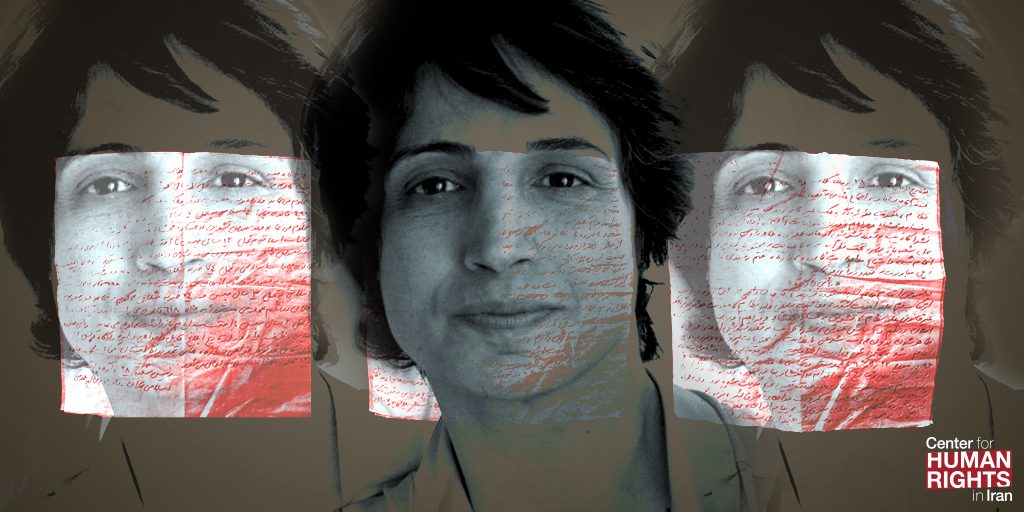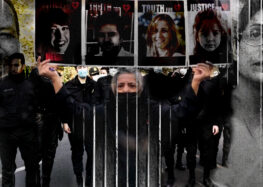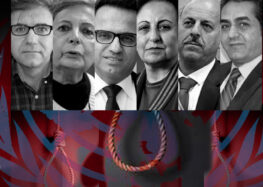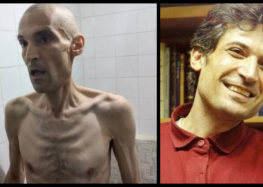Defying Unjust Court Process, Nasrin Sotoudeh Refuses to Appeal Prison Sentence

Husband Publishes Sotoudeh’s Verdict Notes, Addressing Discrepancies
Refusing to legitimize the unjust judicial process in Iran, in which defendants held on politically motivated charges are sentenced to long prison terms without fair trials, imprisoned defense attorney Nasrin Sotoudeh has stated she will not appeal her prison sentence.
Sotoudeh has also provided notes on her verdict (she was denied a physical copy) to her husband. According to these notes, Sotoudeh will be required to serve 12 years out of the 33.8 years and 148 lashes she was sentenced to in February 2019 (subject to appeal). It is not clear whether a previously issued sentence of five years will be added to that sentence.
“During visitation [on March 17, 2019] Nasrin said she does not accept the verdict or the Iranian judicial system so she will not seek a challenge and refuses to be present at the Appeals Court just as she was absent from the preliminary trial,” her husband Reza Khandan told the Center for Human Rights in Iran (CHRI) on March 18.
During a phone conversation on March 11 in which she was only allowed to speak briefly, Sotoudeh told her husband that branch 28 of the Revolutionary Court in Tehran had sentenced her to 33 years in prison and 148 lashes.
Coupled with a previous sentence of five years in prison that was also issued in absentia, her total sentence amounted to 38 years in prison and 148 lashes, Sotoudeh told Khandan on March 11. (Khandan was also sentenced to six years in prison in January 2019 in part for posting updates about his wife’s case on Facebook. It remains to be seen what will happen to their two children if both parents are imprisoned at the same time.)
According to Article 134 of Iran’s Islamic Penal Code, in cases involving multiple convictions, such as Sotoudeh’s, one should serve no more than the maximum punishment for the charge that carries the heaviest sentence. After the application of Article 134 to her case, Sotoudeh’s sentence would amount to 12 years in prison, she told Khandan. Again, it is unknown whether the sentence of five years from a 2015 conviction would be added to those twelve.
However, on March 5, presiding Judge Mohammad Moghiseh told state-funded media outlets that Sotoudeh would have to serve seven years in prison. To date, no judicial official has clarified his comments. Taken together, these discrepancies caused confusion and varying sentences to be reported by international media outlets.
Sotoudeh’s conviction and sentence is based on her peaceful defense of human rights in Iran, including by attending peaceful protests and advocating for the amendment of laws that enable peaceful activism to be prosecuted as a national security offense.
A review of her aggregated sentences highlights the depth of repression in Iran.
By sentencing her to a total of 38 years in prison, of which she will serve 12 (subject to appeal), Iran’s judiciary is warning civil society that engaging in any peaceful activity–including attending protests, giving interviews to media outlets, or criticizing state policies such as the death penalty–could land you in jail.
Sotoudeh Releases Notes of Verdict, Denied Physical Copy
Sotoudeh took notes based on her written verdict (she was denied a physical copy). One week later, she gave them to her husband, who published them on Facebook.
In politically sensitive cases, Iranian courts deny defendants written copies of their verdicts. Instead, they are only allowed to see the verdict and take handwritten notes of it in the presence of a judicial representative.
According to Sotoudeh’s notes, her verdict states she was sentenced to a total of 33.8 years in prison and 148 lashes based on the following seven charges:
- “The court sentences the aforementioned to seven years and six months in prison for assembly and collusion with the intention to commit a crime against national security based on Article 610 of the Islamic Penal Code.”
- “And regarding propaganda against the state, sentences her to one year and six months in prison, including time spent in detention, based on Article 500 of the Islamic Penal Code.”
- “And regarding membership in the legal Legam organization [group against capital punishment], sentences her to seven years and six months in prison, including time spent in detention, based on Article 499 of the Islamic Penal Code.”
- “And in regards to encouraging corruption and prostitution, sentences her to 12 years in prison, including time spent in detention, based on Article 639 of the Islamic Penal Code.”
- “And in regards to appearing in public without the Islamic hijab, sentences her to endure 74 lashes, based on Article 638 of the Islamic Penal Code.”
- “And in regards to publishing falsehoods with the intention to disturb public opinion, sentences her to three years in prison and 74 lashes, including time spent in detention, based on Article 698 of the Islamic Penal Code.
- “And in regards to disturbing public order, sentences her to two years in prison, including time spent in detention, based on Article 618 of the Islamic Penal Code.”
The verdict also included this statement, according to Sotoudeh’s notes: “This verdict, issued in absentia, can be appealed within 20 days… Article 134 of the Islamic Penal Code shall be applied.”
After the application of Article 134, Sotoudeh’s sentence of 33.8 years in prison would amount to 12 years in prison for the charge of “encouraging corruption and prostitution.” (It is not clear whether she would be forced to serve an additional five based on a 2015 conviction).
The 12-year sentence was issued for Sotoudeh’s peaceful defense of a woman’s right to appear in public without a hijab. All of the charges Sotoudeh was convicted of were based on her peaceful advocacy of human and civil rights in Iran.
CHRI has documented multiple cases in which many other human rights advocates have been sentenced to long prison terms in Iran under similar charges, including Narges Mohammadi, Atena Daemi, Maryam Akbari-Monfared, Arash Sadeghi and Saeed Shirzad.
Sotoudeh Refuses to Legitimize Unjust Legal Process
Khandan told CHRI that his wife “waved her right to choose a lawyer for two reasons.”
“First, because of the Note to Article 48 [of the Criminal Procedures Regulations] which says prisoners accused of [national] security crimes can only choose lawyers approved by the judiciary chief,” he said.
“Second because in 2010, four of the six lawyers who had represented her were prosecuted and she does not want to cause any problems for her colleagues again,” he added.
A prominent human rights-focused attorney, Sotoudeh’s conviction received widespread international condemnation.
Speaking about politically sensitive issues in Iran could result in arrests and imprisonment but some human rights activists based inside the country also called for her release.
“The … prison sentence issued against Ms. Sotoudeh, like the hundreds of similar verdicts by two or three specific courts [in the Revolutionary Court System] in recent years, is deplorable and lacks legal merit,” tweeted prominent journalist and rights advocate Emad Baghi on March 13.
“Hopefully, at least for the sake of its own dignity, the judiciary will nullify this verdict in the appeals process,” he added.
Following is a translation of Sotoudeh’s verdict notes, a copy of which was obtained by CHRI:
No: 150/28/27
Date: February 19, 2019
On January 1, 2019, Branch 28 held a trial regarding case 20891/97 in the matter of charges against Ms. Nasrin Sotoudeh, the daughter of Aghajan… and issued the following verdict:
The court looked into the charges and considered the Intelligence Ministry’s report against Ms. Sotoudeh regarding assembly and collusion with the intention to commit a crime against national security, effective membership in an anti-state group, encouraging and preparing the grounds for corruption and prostitution, disturbing public peace and order, publishing falsehoods with the intention to disturb public opinion, and appearing in public without the Islamic hijab.
After the December 2017 riots [protests], the accused issued a statement in collaboration with anti-revolutionary elements inside and outside Iran, who are seeking to overthrow the state, and called for a referendum under UN supervision in order the determine the form of government.
She, along with [Sotoudeh’s former colleague, Nobel Peace Laureate] Shirin Ebadi, the fugitive head of the [banned] Defenders of Human Rights Center, as well as the center’s deputy head Narges Mohammadi, Payam Akhavan, Jafar Panahi, Mohsen Sazegara, Mohammad Seifzadeh, Hassan Shariatmadari, Heshmatollah Tabarzadi, Abolfazl Ghadyani, Mohsen Kadivar, Kazem Kardavani, Mohsen Makhmalbaf, Mohammad Maleki and Mohammad Nourizad, a collection of anti-state fugitives outside Iran and adversaries inside the country, signed and published a statement aimed at overthrowing the Islamic Republic with a referendum.”
Her activities included numerous interviews with foreign media outlets opposed to the Islamic Republic. Following the appearance of women in public without the hijab, she published a video message without a hijab to support girls in removing the hijab against the law and encouraged them to commit corruption and prostitution.
She collaborated with her husband, Reza Khandan, and other anti-state individuals, in support of removing the hijab in public by placing a bouquet of flowers on the utility box on the street where women had removed their hijab and distributed pins with the slogan: “I am against forced hijab.”
On February 8, 2018, she took part in an illegal rally held by the Gonabadi dervishes, and on February 9, 2018, along with other members of the outlawed Legam group, held an illegal gathering in front of the UN office and gave a speech. She also participated in an illegal gathering against the Islamic Republic in front of Evin Prison on November 7, 2017.
Based on the court’s review of the contents of the case, the aforementioned is guilty of the attributed crimes without a shadow of a doubt.
The court sentences the aforementioned to seven years and six months in prison for assembly and collusion with the intention to commit a crime against national security based on Article 610 of the Islamic Penal Code.
And regarding propaganda against the state, sentences her to one year and six months in prison, including time spent in detention, based on Article 500 of the Islamic Penal Code.
And regarding membership in the legal Legam organization (against capital punishment), sentences her to seven years and six months in prison, including time spent in detention, based on Article 499 of the Islamic Penal Code.
And in regards to encouraging corruption and prostitution, sentences her to 12 years in prison, including time spent in detention, based on Article 639 of the Islamic Penal Code.
And in regards to appearing in public with the Islamic hijab, sentences her to endure 74 lashes, based on Article 638 of the Islamic Penal Code.
And in regards to publishing falsehoods with the intention to disturb public opinion, sentences her to three years in prison and 74 lashes, including time spent in detention, based on Article 698 of the Islamic Penal Code.
And in regards to disturbing public order, sentences her to two years in prison, including time spent in detention, based on Article 618 of the Islamic Penal Code.
This verdict, issued in absentia, can be appealed within 20 days… Article 134 of the Islamic Penal Code shall be applied.
From 2010-13, Sotoudeh served three years in Evin Prison for taking on politically sensitive cases in Iran as a defense attorney.
In July 2018, the International Bar Association’s Human Rights Institute (IBAHRI) sent a letter to Iran’s Supreme Leader Ali Khamenei calling for Sotoudeh’s immediate release.
Sotoudeh is among at least seven human rights attorneys who were arrested in Iran in 2018 in a widening crackdown aimed at further restricting detainees’ right to counsel.
In September 2018, she was awarded the prestigious Ludovic Trarieux Human Rights Prize for her commitment to human rights and the independence of the legal profession. Sotoudeh was also awarded the European Parliament’s Sakharov Prize for Freedom of Thought in 2012.
In November 2018, the UN reiterated its “concern at the in-absentia conviction and subsequent imprisonment” of Sotoudeh and called on Iran to guarantee her right to a fair trial along with her husband and fellow women’s rights activist Farhad Meysami, as well as ensure that they are not “deprived arbitrarily of their liberty.”
Adding its voice to an increasingly international call, the European Parliament overwhelmingly passed a motion in December 2018 urging the Iranian authorities to “immediately and unconditionally release” Sotoudeh.
“Sotoudeh has been sentenced in a Kafkaesque trial severely lacking in international standards of due process,” said CHRI’s Executive Director Hadi Ghaemi in a press release published on March 5.
“The Iranian Judiciary is punishing Sotoudeh for trying to uphold the rule of law and the right to a fair defense in cases involving defendants facing politically motivated charges,” he added.
“First they went after the journalists, activists and dissidents,” he said. “Now they’re going after their only line of defense.”






